Current Community Engagement Fellows
2024 Community Engagement Fellowships
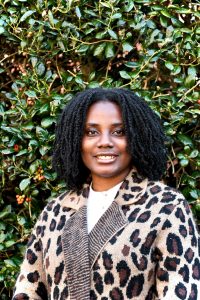 HealthEdu- Bridging healthcare gaps for international students in North Carolina
HealthEdu- Bridging healthcare gaps for international students in North Carolina
Student: Oluwabusolami Ale
Area of study: Health Policy and Management
Community partner: The UNC-CH International Student Organisation
Faculty advisor: Lori A. Evarts
Moving to a new country with a different culture can be a highly stressful experience for international students. The transition is marked with both excitement and a lot of uncertainties. Many travel alone and move far away from loved ones. Some students undergo health-related changes, both physically and mentally; unfortunately, many self-manage the symptoms they experience and are reluctant to visit the hospital or seek help due to the fear of incurring huge medical bills, a lack of understanding of the options available to them to seek healthcare, or challenges navigating the new healthcare system. International students are required to purchase an insurance plan every semester; however, many see it as just one of the bills they need to pay; they do not understand how to utilise it, the terminologies in their contract, and how this can best suit their health and financial needs. For some international students, this system of healthcare is new and extremely different from their home country. The primary objective of this project is to promote a culture of proactive healthcare-seeking behaviour among international students at the University of North Carolina at Chapel Hill.
 Community Archaeology at the Cowee Tunnel Labor Camp, Jackson County, North Carolina
Community Archaeology at the Cowee Tunnel Labor Camp, Jackson County, North Carolina
Student: Cayla Colclasure
Area of study: Anthropology, Historical Archaeology
Community partner: Danielle Duffy of the WCU Mountain Heritage Center and the Jackson County chapter of the NAACP
Faculty advisor: Anna Agbe-Davies
In recent years, the people of Jackson County, North Carolina, have begun reckoning anew with a difficult aspect of their history. During the late 19th century, thousands of incarcerated men and boys were sent to labor camps in Jackson County to work on building the Western North Carolina Railroad (WNCRR) under the convict leasing system. The majority of these men and boys were African Americans incarcerated under discriminatory laws designed to effectively re-enslave them. In 1882, 19 of the men working on the Cowee Tunnel drowned in a preventable accident as they were ferried across the Tuckasegee River from their work site to the labor camp. In 2022, the Jackson County NAACP successfully applied for a state historical marker to be placed near the tunnel memorializing these incarcerated workers. Public historians from Western Carolina University will soon unveil an exhibit about the men who lived, worked, and died along the tracks. However, there remains an untapped source of information about this history: archaeology. In consultation and collaboration with members of the Jackson County NAACP and activist scholars from Western Carolina University, I will conduct archaeological excavations at the Cowee Tunnel Prison Labor Camp site to contribute to ongoing research and storytelling. Together we will also engage in a series of community outreach and education programs.
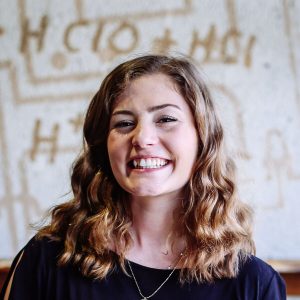 Using photovoice to explore perceptions of water and sanitation in the AL Black Belt
Using photovoice to explore perceptions of water and sanitation in the AL Black Belt
Sherpa Community Engagement Fellowship
Student: Olivia Harmon
Area of study: Environmental Sciences and Engineering
Community partner: Emily McGlohn, Auburn University, Rural Studio
Faculty advisor: Joe Brown
Alabama’s Black Belt is characterized by a rich cultural heritage and as the birthplace of the Civil Rights movement in the United States. However, the region has recently gained national attention for failing or nonexistent wastewater infrastructure outside cities served by conventional sewerage leading to the Department of Justice’s first environmental justice investigation under Title VI of the Civil Rights Act of 1964. This investigation concluded with the citing of two areas of concern: the use of fines and law enforcement to punish people with inadequate wastewater treatment systems and inadequate action to assess and address health risks from raw sewage. In response to this sanitation crisis in the rural south, this research will examine the effects of an ongoing infrastructure project in Newbern, Alabama, located in the Black Belt region of Alabama. Specifically, this research is intended to assess the effects this sanitation intervention on environmental contamination, public health risk, and individual well-being. One way I will assess the intervention is through conducting a qualitative analysis via photovoice to capture residents’ perceptions of sanitation deficits prior to the installation of new sanitation infrastructure.
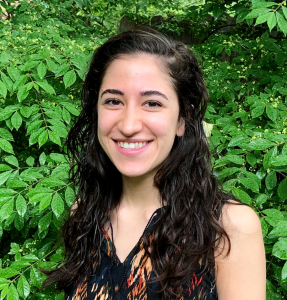 Social Influence on Social Media: Through the eyes of teens
Social Influence on Social Media: Through the eyes of teens
Student: Maria Maza San Vicente
Area of study: Psychology and Neuroscience
Community partner: Student U
Faculty advisor: Eva Telzer
Social media has fundamentally transformed the landscape of adolescent social interactions, providing teens with broader social networks and ample opportunities for digital social influence. While certain online influences may be beneficial for adolescent health outcomes, others may have detrimental outcomes, and it is currently unclear the impact a given digital influence might have and for whom. Concerns on the topic have been raised among academics, parents, and educators in North Carolina, with policy groups asking lawmakers to take action to help support healthy media use among youth. Nevertheless, there is a paucity of research working with youth, the people who know the most by virtue of their lived experiences, to study the impact of digital social influence on adolescent outcomes. By excluding adolescent voices, we have limited our collective understanding of the effects of online social influence on adolescents and are failing to generate solutions that are helpful, applicable, and accessible to those it impacts the most. This project proposes integrating youth perspectives into research through community-based participatory methods to identify how and why digital social influences may be impacting their development.
Partnering with Student U, an education nonprofit in Durham serving first-generation college students, we will engage 12 high school students from Student U in photovoice, a collaborative, equitable, and actionable research methodology that combines art and psychology. Through facilitated discussions, we aim to 1) better understand adolescent’ real lived experiences with digital social influence, 2) explore the individual, community, and systemic-level factors that determine how digital social influence may impact health, and 3) identify solutions for barriers to positive health outcomes. The completion of this project will uplift voices of adolescents to ensure a more precise understanding of digital peer influence and improve future recommendations for youth, adults, and policymakers.
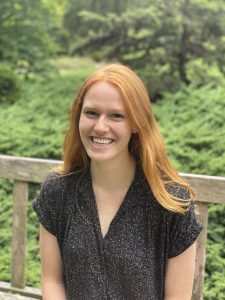
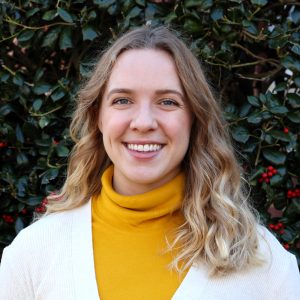 Shifting Power through Communication: Bi-Directional Conversation Guides for Patients and Clinicians
Shifting Power through Communication: Bi-Directional Conversation Guides for Patients and Clinicians
Students: Mary Kelly McHugh and Elizabeth Anne Finnessy
Areas of study: Health Behavior and Nursing
Community partner: ACHIEVE Community Coalition; Jennifer Medearis-Costello, EMBRACe
Faculty advisor: Alexandra Lightfoot
AC3HIEVE (Advancing Community and Clinical care for Childbirth related Hypertension through Implementation, Engagement and Valuing Equity) is an NHLBI funded study using community engagement and implementation science approaches to address inequitable identification and response to hypertensive disorders of pregnancy (HDP) in outpatient settings. The ACHIEVE Community Engagement team partners with a community coalition, patients, and providers to tailor evidence-based guidelines to several NC clinical sites’ unique environments. In an earlier phase of the project, our team engaged with our partners to conduct a needs assessment and Patient Workshops. These processes were used to identify community assets, needs, and priorities related to HDP. Through this engagement, ACHIEVE’s partners raised a need for resources to guide both providers’ respectful communication about the urgent health situation of HDP, and patients’ communication to providers about oft-dismissed symptoms. Ultimately, systemic change is needed to address the root causes of inequities around HDP. However, bi-directional communication guides could serve as a first step in shifting power to patients.
We are using a human-centered design approach in the development of these guides. Since our partners raised the idea for the guides, we have conducted environmental scans of the literature on similar tools, hosted three content brainstorming sessions with different groups of community partners, created logic models to scaffold our work, and compiled our findings to identify themes in the data. Soon, we will create our first prototype using the identified themes. With the support of this grant, we will undertake a thorough piloting with our partners, once the prototypes have been developed. Such a process will help us ensure that the materials that arose from our community engagement are responsive to partners’ requests and goals by iterating on our initial designs to develop more useful tools.
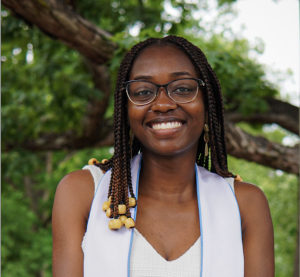 Radical Placemaking: Reanimating Ewe Ecological and Cultural Memory
Radical Placemaking: Reanimating Ewe Ecological and Cultural Memory
Sherpa Community Engagement Fellowship
Students: Fowota Mortoo
Area of study: Geography
Community partner: ANO Institute of Arts and Knowledge, Nana Oforiatta Ayim
Faculty advisor: Chérie Rivers
Situated at the intersection of cultural heritage, ecology, and place-making, this research will examine how Ewe ecological practices can redress persisting colonial logics of extractivism in southern Ghana. The project consists of two major components: (1) creation of an audiovisual archive based on oral histories with small-holder farmers who employ indigenous Ewe agricultural practices and (2) an educational garden on a small tract of land that currently operates as a commercial pineapple farm.
Drawing upon Bissau-Guinean agronomist Amilcar Cabral’s work with the Experimental Farm of Pessubé, this project aims in a similar manner to transform material geographies in ways that recognize the interconnected nature of land, politics, economy, and culture. In collaboration with the ANO Institute of Research and Knowledge, an organization committed to reimagining food and education systems through the establishment of a farm and school in the mountains of Aburi, Ghana, this research will make a substantial contribution in broadening the geographic reach of the subfield of Black Geographies (whose scholarship is largely North American and Caribbean centric) while also contributing to community-grounded work that has significance beyond the boundaries of academia.
Read descriptions of previous Community Engagement Fellowship projects here.
